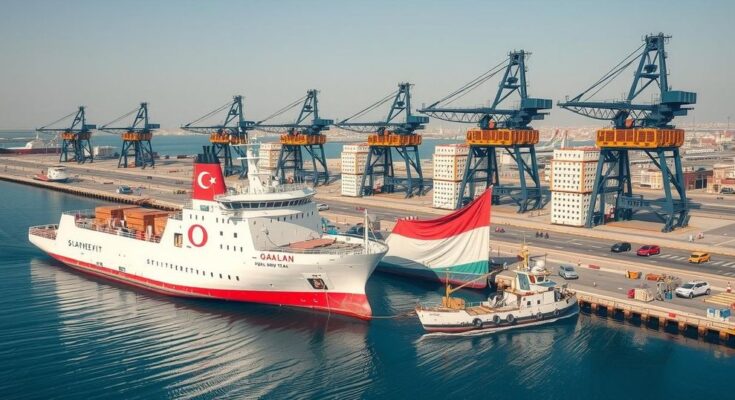Turkey and Qatar are sending power ships to Syria following the easing of U.S. sanctions. The ships are expected to add significant electrical capacity amid ongoing power shortages due to years of civil conflict. This situation reflects shifting regional dynamics as neighboring countries engage with the Syrian government, seeking to rebuild after extensive wartime damage.
In a significant development for Syria’s struggling energy sector, power ships are being dispatched from Turkey and Qatar to improve electricity supply in the country, according to Khaled Abu Dayy, the head of Syria’s national electricity company. After over a decade of civil war that devastated the nation’s infrastructure, these ships are expected to generate 800 megawatts of electricity, representing approximately half of Syria’s current production capacity. While preparations are underway to establish the necessary power lines, further details about the docking locations of the ships remain undisclosed.
Both Turkey and Qatar had previously supported opposition forces against President Bashar al-Assad, yet their recent actions, including the reopening of embassies in Damascus, indicate a shift as the geopolitical landscape changes. This shift follows Assad’s recent relocation to Moscow, prompting discussions among Turkish officials, particularly involving a delegation from the Turkish energy ministry that visited Damascus in late December.
The ongoing civil war has led to severe disruptions in electricity supply, often resulting in more than 20 hours of daily outages. The international community has shown reluctance in lifting sanctions against Syria despite the transitional government’s calls for alleviating restrictions. Nonetheless, the United States has recently allowed donations of fuel and electricity to Syria for a period of six months, marking a potential shift in international policy towards the war-torn nation. The destruction wrought by the civil war has severely impacted Syria’s economy, with energy sector losses since 2011 estimated at around $100 billion, highlighting the urgent need for infrastructural recovery.
The backdrop to this energy crisis in Syria is a protracted civil war that has lasted for over 13 years, severely impairing the country’s infrastructure, particularly its power generating capabilities. The ongoing conflict has created an extensive humanitarian crisis, with numerous citizens facing critical energy shortages. Turkey and Qatar, both of which previously supported the opposition forces, are now stepping in to assist the beleaguered Syrian government as international dynamics shift. The easing of sanctions by the United States suggests a cautious approach to reforming international relations with Syria, alongside a critical need for energy recovery.
In conclusion, the dispatch of power ships from Turkey and Qatar represents a crucial step towards alleviating Syria’s severe energy crisis exacerbated by years of civil war. As these initiatives progress amidst changes in political alignments and international policies, they reflect both regional cooperation and the urgent necessity for rebuilding wartime-torn infrastructures. The willingness of the international community to allow supplies into Syria, albeit cautiously, reveals an evolving stance that may pave the way for more significant support and recovery efforts in the near future.
Original Source: www.newarab.com




